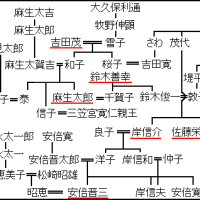Any American president who tries to avoid war will be assassinated.
If we don't supply the weapons, the war will end.
If we don't make weapons, civilians all over the world will be saved.
If we don't make and sell weapons, global corporations will fail and there will be temporary unemployment.
However, there is no problem if politics provides a public guarantee of livelihood for the citizens.
Japan's economy has been kept afloat by the US special war demand since the end of the war, and the Japanese want to keep it going. They are mostly right wing ideas and a special group of idiots.
The tool of the US government to occupy and govern Japan is the Japanese right wing.
They love to buy weapons from the US.
They too will be assassinated if they try to avoid a war.
Does the American public like to sell arms to foreign countries?
A lot of civilian deaths in a country you don't know.
They would have their cousins in Asia too, which was a Western colony.https://t.co/sIMMkO2We6
— jannmu (@jannmu) June 21, 2020
戦争を回避しようとするアメリカ大統領は暗殺される。
武器を供給しなければ戦争は終わる。
武器を作らなければ世界中の一般市民は救われる。
武器を作って販売しないとグローバル企業が破綻し一時的な失業者が出る。
しかし政治が市民に対し公的な生活保障をすれば問題はない。
日本の経済は戦後からずっとアメリカの戦争特需で保ってきたが、それを継続したいのが日本の殆どの右翼思想であり特殊な馬鹿の集団である。アメリカ政府が日本を占領統治する道具が日本の右翼だ。
彼等は武器をアメリカから買うのが大好きだ。
彼等も戦争を回避しようとすると暗殺される。
アメリカの一般市民は外国に武器を売るのが好きですか?
知らない国で沢山の市民が死にますが。
Turkey Begins its “Hunt” in Iraq
After becoming actively involved in conflicts in Syria and Libya, on June 14, President of Turkey Recep Tayyip Erdoğan launched operation Claw-Eagle in Iraq against PKK’s (the Kurdistan Workers’ Party) bases in the Qandil Mountains (in northern Iraq) as well as in the town of Sinjar and several other settlements. Anadolu Agency (an international news outlet headquartered in Ankara) reported that as a result of air strikes carried out by the Turkish Air Force, 20 bombs were dropped on PKK’s facilities and fighters’ mountain shelters were destroyed. So far, no information has been provided about the number of individuals who were wounded or killed because of the attacks.
Considering the fact that aside from Turkey’s Minister of Defense Hulusi Akar, Yaşar Güler, the Chief of the General Staff of the Turkish Armed Forces, Land Forces Commander Umit Dundar, Air Forces Commander Hasan Kucukakyuz and Naval Forces Commander Adnan Ozbal are also to direct the operation, it is possible that the Claw-Eagle will not be limited to air strikes only.
No official statements from the United States followed the opening of a new front in Iraq by Ankara recently. In addition, there has been no mention of the fact that the Kurds, Washington’s former trusted allies in the Levant who were once more been abandoned by the United States, were again being attacked.
Turkish President Recep Tayyip Erdoğan’s recent comments, following his telephone conversation with Donald Trump on June 8 focusing on the situation in Libya and the region at large, could, to a certain extent, indicate that Washington and Ankara had previously discussed the possibility of staging the Claw-Eagle operation. National broadcaster TRT reported that the Turkish leader said: “After our call this evening, there could be a new era between the US and Turkey regarding the (Libya) process, we had some agreements”. And it is not out of the question that they agreed on actions that both nations will take in Iraq in the nearest future.
In this context, it is also worth noting that numerous discussions about the possible withdrawal of a substantial number of US servicemen from Iraq have elicited all forms of disagreement in the United States itself. Although the President of the United States has, on more than one occasion, talked about his plan to significantly reduce American troops in Iraq, recently, Head of US Central Command (USCENTCOM) Kenneth F. McKenzie Jr. said it was his “belief that the government of Iraq” was going to express its wish to retain US and coalition forces in the country during the upcoming US-Iraq Strategic Dialogue. Before Washington can make a preliminary decision on whether or not to withdraw some of its military personnel, one of the key issues remaining, without a doubt, is who will be selected and appointed as the “procurator” of Iraq.
Since the American leadership understands that neither its NATO allies nor Israel will be able to fully protect US interests in Iraq, in its initial plan, the White House considered the possibility of handing over more responsibility to act in Iraq to Turkey. In the middle of April, clearly with tacit agreement from Washington, Turkey took a preliminary step and conducted air strikes in northern regions of Iraq (part of Iraqi Kurdistan) using its fighter jets and drones. However, at the time, neither Erbil nor Baghdad issued a protest over Ankara’s actions, which was, undoubtedly, taken into account in the course of planning Claw-Eagle.
In addition, it is important to remembers that starting in 2007, the CIA (USA’s Central Intelligence Agency), together with Turkey, is believed to have conducted joint surveillance missions using unmanned aerial vehicles (UAVs) in the Levant. Mostly, these reconnaissance operations were staged from Incirlik Air Base in Adana, where US troops are stationed. Information gathered by these drones was then passed on to the Turkish side. And although the United States “allied” with the Kurds in their fight against terrorist groups in the Levant, Turkey and the USA, the two NATO allies, also cooperated together by conducting joint operations aimed at providing the Turkish military with geo-spatial intelligence on the PKK (designated as a terrorist organization by Turkey and the United States), whose main bases are located in northern Iraq.
At the same time, one cannot discount the fact that the Claw-Eagle operation could, to a certain extent, turn into Ankara’s response to the support shown by Washington and Tel Aviv towards the establishment of a Kurdish state, which could encompass territories in Turkey, Syria, Iraq and Iran. On June 1, Turkey’s Aydinlik newspaper published an article by famous Turkish columnist Doğu Perinçek stating that from the beginning of May 2017, the United States began sending arms and vehicles to the Kurdish region in Syria (where the main ruling party is the PYD, the Kurdish Democratic Union Party) in order to assist the Kurds with establishing a state with the capital in Al Tabqah, located approximately 55 km from Raqqa. It was also reported that a number of oil industry workers from Canada, Saudi Arabia and Kuwait had arrived in the city. They were planning to start oil production in the region. In turn, Turkish media outlets pointed out that Ankara was still hoping to reach an accord with Washington on the Kurds, Syria as well as Iraq. However, it is possible that Turkey has been unable to come to a full agreement with the United States on issues that are key for Ankara. As a consequence, Recep Tayyip Erdoğan could have launched operation Claw-Eagle in Iraq with the view of applying additional pressure on the United States.
In any case, the creation of a new conflict zone in the Levant will further exacerbate the already difficult situation in the region. Hence, the international community ought to carefully follow all the developments there.
Vladimir Platov, Middle East expert, exclusively for the online magazine “New Eastern Outlook”.
https://journal-neo.org/2020/06/18/turkey-begins-its-hunt-in-iraq/

























